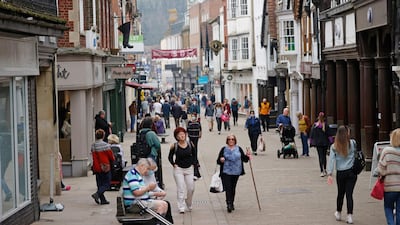Footfall in Britain’s retail sector fell 69 per cent in March when much of the country was still under lockdown, compared with the same month two years ago before the coronavirus pandemic had started, according to the British Retail Consortium.
But there were signs of recovery as the figure was a slight improvement on February's 73.5 per cent contraction and above the three-month average decline of 72 per cent.
Footfall on high streets fell 64.6 per cent in March compared with the same month in 2019, a slight decline from February’s data, while shopping centres suffered a 73 per cent drop.
“Footfall crept up on high streets and in shopping centres as warmer weather coincided with the end of the government’s ‘stay at home’ requirements,” said Helen Dickinson, chief executive of the BRC.
“Consumers appear to be more confident about visiting shops, showing that the safety measures put in place are clearly helping to make shoppers feel more comfortable visiting and returning to stores.”
Britain’s retail sector has been hammered by the Covid-19 crisis after non-essential shops were ordered to close during three lockdowns in England and much of the rest of the country.
Last year, retailers suffered their worst annual performance on record, with an overall decline in sales of 0.3 per cent on the year, according to the BRC-KPMG retail sales monitor, with the typically bumper Christmas period offering little respite for high street shops.

UK retail sales bounced back in February, with the volume of goods sold in shops and online rising 2.1 per cent, a more positive figure than the 8.2 per cent drop in January, according to data from the Office for National Statistics.
With non-essential shops set to reopen next week, the BRC hopes non-food stores can trade effectively to make up the £30 billion ($41.35bn) in lost sales over the three lockdowns, said Ms Dickinson.
"Savings have been building up over lockdown, and the economic recovery relies on retailers being able to unlock the pent-up demand in the economy," she said.
Ahead of the reopening, the BRC is asking consumers to help keep shop workers safe and ensure there is no risk to the government’s roadmap out of lockdown.
Government safety guidance stipulates that all customers must follow social-distancing rules, shop alone or in small groups, follow hygiene rules and wear a face covering unless they have an exemption.
The pandemic has also seen a shocking rise in violence and abuse against shop workers, with some coughed on, attacked or threatened when they have encouraged customers to follow the rules.
“Regrettably, throughout this appalling pandemic, incidents of abuse towards shop workers doubled," said Paddy Lillis, general sectary at the Union of Shop, Distributive and Allied Workers.
"It has been a terrible year, with Usdaw’s survey finding that nearly 90 per cent of shop workers suffered abuse and Covid safety measures have now become the significant flashpoints."
The sector has spent hundreds of millions of pounds on measures designed to prevent the transmission of Covid, including safety glass, queue-management systems, social distancing signs, better ventilation and more frequent cleaning.
Looking ahead, Andy Sumpter, regional retail consultant for Sensormatic Solutions, said the reopening of non-essential retail indicates "green shoots" of recovery for the sector.
"The real test comes as retail reopens and whether indeed that reopening is, as hoped, irreversible," Mr Sumpter said.
"After a year of yo-yoing in and out of lockdown, retailers will be hoping for stability and, once again, will be counting on the continued support of shoppers if any sort of bounce back is to be sustained."


